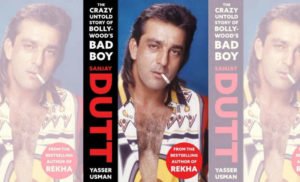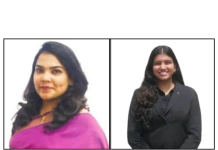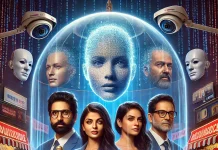As per reports, actor Sanjay Dutt has decided to take legal action against Juggernaut Books for publishing his biography without his permission. Authored by film journalist Yasser Usman, the book ‘The Crazy Untold Story of Bollywood’s Bad Boy — Sanjay Dutt’ exposes some controversial events from the actor’s personal life and charts the course of Dutt’s life through relationships with his “many glamorous girlfriends”, his struggle with addiction, love for guns, and his embroilment in the 1993 Mumbai blasts and the city’s underworld.
The reports state that Sanjay Dutt’s lawyers have sent a legal notice to the publishing house in response to which Juggernaut Publications has said that contents of the proposed book are based on information available in public domain from authentic sources.
Dutt’s grievance is also based on the excerpts of the book which have been publicized by the publishing house which show excerpts not only from newspapers and his old interviews but also on 1990’s tabloids and gossip magazines, which he feels is hearsay and not true. Dutt has also announced that his official autobiography will be out soon which will be authentic and based on facts.
In this post, I would like to discuss the legal issues surrounding such unauthorized biographies under the following headings:
- Right to privacy
- Publicity Rights
- Right to privacy:
The right to privacy is a fundamental right under Article 21 of the Constitution of India and it protects individuals against unlawful government invasion. The landmark precedent on right to privacy is Supreme Court’s decision in R. Rajagopal V/s. State of Tamil Nadu [AIR 1995 SC 264] in which restrictions on the usage of a person’s biography were envisaged. However, a person whose privacy has been infringed by a private individual may seek compensation through a tort action, which may be coupled with an action for defamation and other private wrongs.
In R. Rajagopal V/s. State of Tamil Nadu (also known as the Autoshankar case), the Supreme Court dealt with the issue concerning the freedom of press vis-a-vis the right to privacy of the citizens of this country as well as the parameters of the right of the press to criticise and comment on the acts and conduct of public officials. The first petitioner was the editor, printer and publisher of a Tamil weekly magazine Nakkheeran, published from Madras. The second petitioner was the associate editor of the magazine. The petitioners sought an issuance of an appropriate writ, order or direction under Article 32 of the Constitution, restraining the respondents, from interfering with the publication of the autobiography of the condemned prisoner, Auto Shankar, in their magazine. The Supreme Court held that the petitioners have a right to publish, what they allege to be the life story/autobiography of Auto Shankar insofar as it appears from the public records, even without his consent or authorisation. But if they go beyond that and publish his life story, they may be invading his right to privacy and will be liable for the consequences in accordance with law. Similarly, the State or its officials cannot prevent or restrain the said publication.
Some relevant extracts from this judgment are reproduced below which have set out the jurisprudence on the subject of privacy rights:
“The right to privacy as an independent and distinctive concept originated in the field of Tort law, under which a new cause of action for damages resulting from unlawful invasion of privacy was recognised. This right has two aspects which are but two faces of the same coin (1) the general law of privacy which affords a tort action for damages resulting from an unlawful invasion of privacy and (2) the constitutional recognition given to the right to privacy which protects personal privacy against unlawful governmental invasion. The first aspect of this right must be said to have been violated where, for example, a person’s name or likeness is used, without his consent, for advertising or non-advertising purposes or for that matter, his life story is written whether laudatory or otherwise and published without his consent as explained hereinafter. In recent times, however, this right has acquired a constitutional status.”
The Supreme Court laid down the following broad principles:
(1)The right to privacy is implicit in the right to life and liberty guaranteed to the citizens of this country by Article 21. It is a “right to be let alone”. A citizen has a right to safeguard the privacy of his own, his family, marriage, procreation, motherhood, child-bearing and education among other matters. None can publish anything concerning the above matters without his consent whether truthful or otherwise and whether laudatory or critical. If he does so, he would be violating the right to privacy of the person concerned and would be liable in an action for damages. Position may, however, be different, if a person voluntarily thrusts himself into controversy or voluntarily invites or raises a controversy.
(2)The rule aforesaid is subject to the exception, that any publication concerning the aforesaid aspects becomes unobjectionable if such publication is based upon public records including court records. This is for the reason that once a matter becomes a matter of public record, the right to privacy no longer subsists and it becomes a legitimate subject for comment by press and media among others. We are, however, of the opinion that in the interests of decency Article 19(2) an exception must be carved out to this rule, viz., a female who is the victim of a sexual assault, kidnap, abduction or a like offence should not further be subjected to the indignity of her name and the incident being publicised in press/media.
(3)There is yet another exception to the rule in (1) above – indeed, this is not an exception but an independent rule. In the case of public officials, it is obvious, right to privacy, or for that matter, the remedy of action for damages is simply not available with respect to their acts and conduct relevant to the discharge of their official duties. This is so even where the publication is based upon facts and statements which are not true, unless the official establishes that the publication was made (by the defendant) with reckless disregard for truth. In such a case, it would be enough for the defendant (member of the press or media) to prove that he acted after a reasonable verification of the facts; it is not necessary for him to prove that what he has written is true. Of course, where the publication is proved to be false and actuated by malice or personal animosity, the defendant would have no defence and would be liable for damages. It is equally obvious that in matters not relevant to the discharge of his duties, the public official enjoys the same protection as any other citizen, as explained in (1) and (2) above. It needs no reiteration that judiciary, which is protected by the power to punish for contempt of court and Parliament and legislatures protected as their privileges are by Articles 105 and 104 respectively of the Constitution of India, represent exceptions to this rule.
(4)So far as the Government, local authority and other organs and institutions exercising governmental power are concerned, they cannot maintain a suit for damages for defaming them.
(5)Rules 3 and 4 do not, however, mean that Official Secrets Act, 1923, or any similar enactment or provision having the force of law does not bind the press or media.
(6)There is no law empowering the State or its officials to prohibit, or to impose a prior restraint upon the press/media.
In the case of Selvi. J. Jayalalithaa Vs. Penguin Books India [2013(54) PTC327(Mad)], the Madras High Court had granted a permanent injunction restraining the defendants from publishing the book, namely “Jayalalithaa A Portrait”. While granting injunction against publication of the Book, the Madras High Court held that the third defendant had not taken any authorization from the Plaintiff to write a book on her life in the name of ‘Jayalalithaa A Portrait’ or as a biography. The third defendant contended that she had commenced the work on her own volition to write about the plaintiff and is said to have worked for two years on the preparation of the book without any prior consent of the plaintiff and without any reasonable verification. The Court further held that the private life of the plaintiff written was not involved with the public activities, which is an exception as per the Autosankar case. When the third defendant herself had done all these things on her own volition, she cannot come forward with the plea of incurring much expenditure and she was a notable writer regarding the life of the woman and so on. Accordingly, injunction was granted against publication of the book.
In the case of Akshaya Creations v/s Muthulakshmi [C.R.P (PD)Nos.3943 and 3944 of 2012], Muthulakshmi (wife of Veerappan) had filed a suit seeking injunction against release of the film “Vana Udham” in Tamil and “Attakasa” in Kannada or in any other name, in any other language, portraying the life of Muthulakshmi and her husband, late Veerappan. The trial court passed an order granting injunction restraining the defendants from exhibiting the said films. In an appeal before the Madras High Court, the court relied on the Autoshankar case, the Court allowed the release of the film subject to the producer deleting the marriage scenes between Veerapan and his wife and concluded as under: “Therefore, having regard to the law laid down by the Hon’ble Supreme Court in the aforesaid judgment, and having regard to the undertaking given by the learned Senior Counsel for the revision petitioners, that the revision petitioners would delete those scenes, as stated above, I am of the opinion that the right of privacy of the first respondent is in no way affected and there is no right of privacy available to the first respondent, as the Film is taken on the basis of the Police records and the first respondent has no cause of action, restraining the revision petitioners from exhibiting, exploiting the said Film.”
The Supreme Court in the Right to Privacy judgement i.e. Justice K.S Puttaswamy (Retd.) V. Union of India and ors has held that “Every individual should have a right to be able to exercise control over his/her own life and image as portrayed to the world and to control commercial use of his/her identity. This also means that an individual may be permitted to prevent others from using his image, name and other aspects of his/her personal life and identity for commercial purposes without his/her consent.”
Publicity Rights
While there are enough precedents on right to privacy, the jurisprudence on publicity rights is fairly at a nascent stage in India. Last month, I had covered a case on publicity rights before the Madras High Court where the Court had directed the producers and the director of Tamil film “Nagesh Thiraiarangam” to clarify in all advertisements that the film had nothing to do with legendary comedian C K Nagesh or his theatre by the name.
The “right of publicity’ is the right of an individual to exercise control over the commercial use of the individual’s name, image, likeness or other distinctive features that relate to an individual such as voice, signature, nickname, sobriquet. The ‘right of publicity’ can also be referred to as “personality rights”. This right flows from the ‘right to privacy’ enshrined under Article 21 of the Constitution of India.
The Delhi High Court in the case of ICC Development vs. Arvee Enterprises & anr, has held that
“The right of publicity has evolved from the right of privacy and can inhere only in an individual or in any indicia of an individual’s personality like his name, personality trait, signature, voice, etc.
An individual may acquire the right of publicity by virtue of his association with an event, sport, movie, etc. However, that right does not inhere in the event in question, that made the individual famous, nor in the corporation that has brought about the organization of the event. Any effort to take away the right of publicity from the individuals, to the organiser {non-human entity} of the event would be violative of Articles 19 and 21 of the Constitution of India. No persona can be monopolised. The right of Publicity vests in an individual and he alone is entitled to profit from it.”
The Madras High Court had earlier in the case of Shivaji Rao Gaikwad vs. Varsha Productions, recognized the personality rights of superstar Rajnikanth and injuncted the defendants from using his names and attributes in the film ‘Main Hoon Rajnikanth’ and defaming him.
A list of judgements on personality and privacy rights can be viewed in the judgement section here.
As can be seen from the privacy rights judgements, if a matter is based on public record then the right to privacy no longer subsists and it becomes a legitimate subject for comment by press and media among others. As per reports, Juggernaut Publications is claiming that contents of the proposed book are based on information available in public domain from authentic sources.
The Indian Evidence Act, 1872 provides under Section 74 for the following documents to be public documents:
(1) Documents forming the acts, or records of the acts—
(i) of the sovereign authority,
(ii) of official bodies and tribunals, and
(iii) of public officers, legislative, judicial and executive, 1[of any part of India or of the Commonwealth], or of a foreign country;
(2) Public records kept in any State of private documents.
‘Public Records’ has also been defined under the Public Records Act, 1993 which is an Act to enable the Central Government to coordinate, regulate and supervise the operations connected with the administration, management, preservation selection, disposal and retirement of public records.
Section 2 (e) defines ‘public records’ to include
(i)any document, manuscript and file;
(ii)any microfilm, microfiche and facsimile copy of a document;
(iii)any reproduction of image or images embodied in such microfilm (whether enlarged or not); and
(iv)any other material produced by a computer or by any other device,
of any records creating agency;
Under Section 2(f) “records creating agency” includes, –
(i)in relation to the Central Government, any ministry, department or office of that Government;
(ii)in relation to any statutory body or corporation wholly or substantially controlled or financed by the Central Government or commission or any committee constituted by that Government, the offices of the said body, corporation, commission or committee;
(iii)in relation to a Union Territory Administration, any department or office of that Administration;
(iv)in relation to any statutory body or corporation wholly or, substantially controlled or financed by Union territory Administration or commission or any committee constituted by that Government, the offices of the said body, corporation, commission or committee;
Public records/ public documents thus seem to be documents forming part of Government record or court record. Tabloids, newspaper articles, magazines do not seem to fall within the scope of ‘Public Record’.
In light of the above-mentioned judgements, the question remains as to whether Sanjay Dutt would be able to restrain the publication of the biography on his life which is being done without his authorization. In my view, the strongest grounds Mr. Dutt would have would be (i) violation of right to privacy to the extent the materials are not taken from public records, (ii) defamation- if any content is not true (iii) publicity rights- most of the privacy right judgements mentioned above did not capture the publicity rights angle. Publishing a biography on some celebrity’s life without consent takes away his right to commercialize out of his name and the story of his life. There is a commercial angle to this which does not seem to have been argued in courts. Once this book is published, there would be production houses seeking adaptation rights to make a film out of the book. All these are revenue generating sources and applying the Supreme Court’s decision in the privacy rights judgement, every individual should have a right to be able to exercise control over his/her own life and image as portrayed to the world and to control commercial use of his/her identity. This also means that an individual may be permitted to prevent others from using his image, name and other aspects of his/her personal life and identity for commercial purposes without his/her consent.
Contrary to what the press reports have stated, in my view, Sanjay Dutt may have an arguable case on the aforesaid grounds should he decide to litigate against the publishing house and author of his unauthorized biography.
Image source: here













Comments are closed.